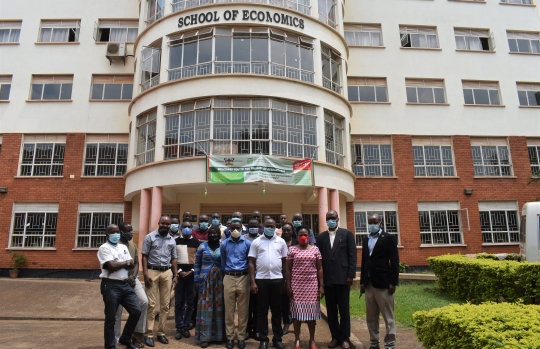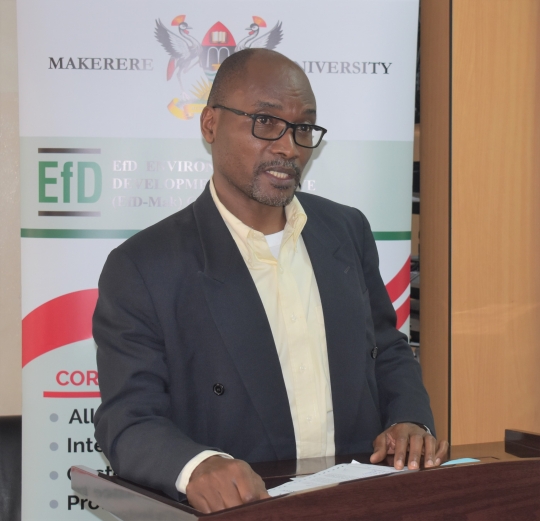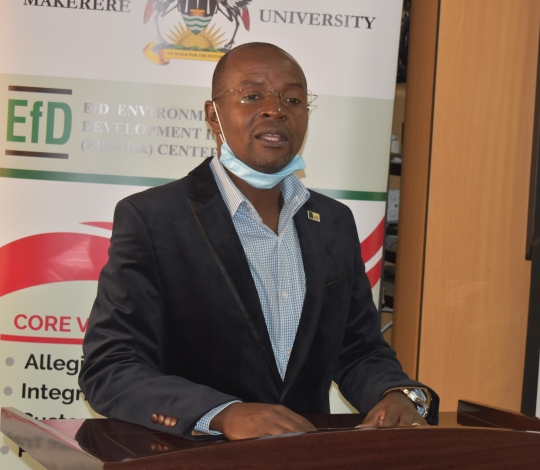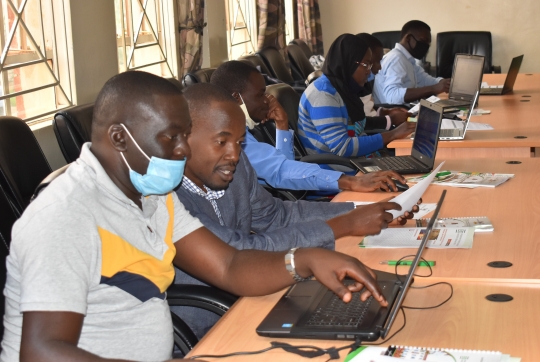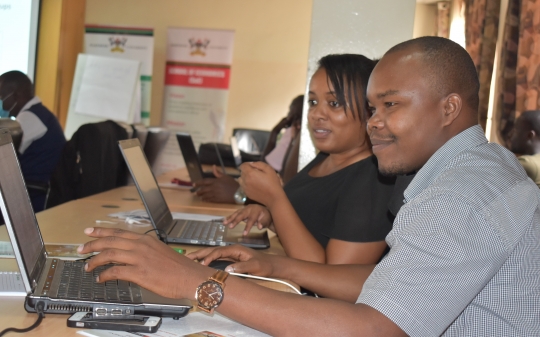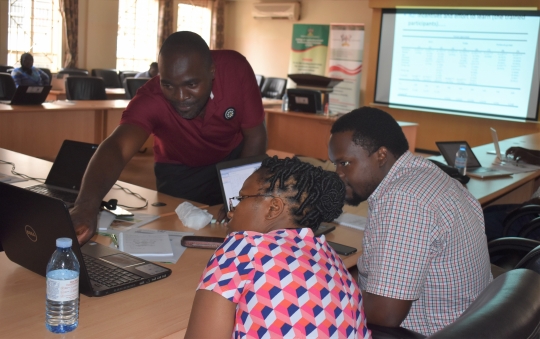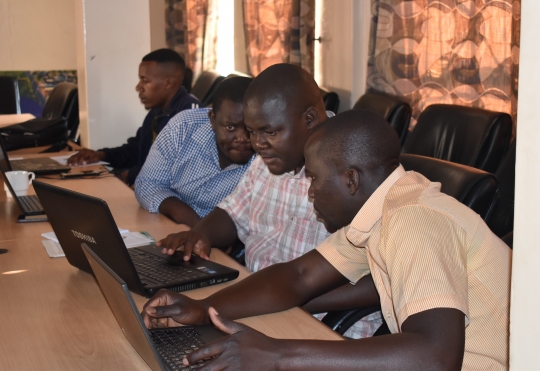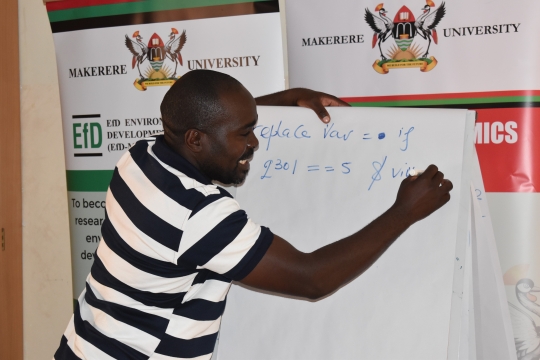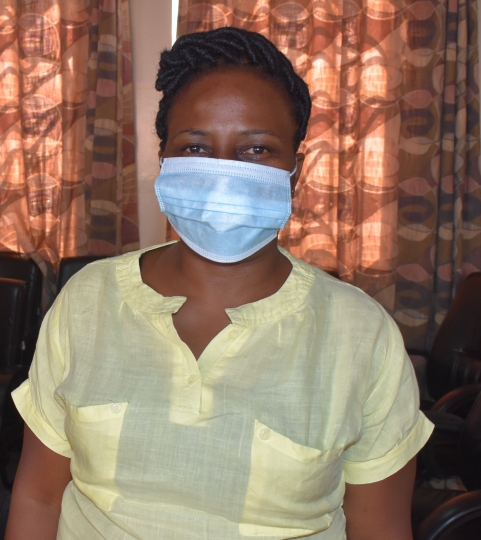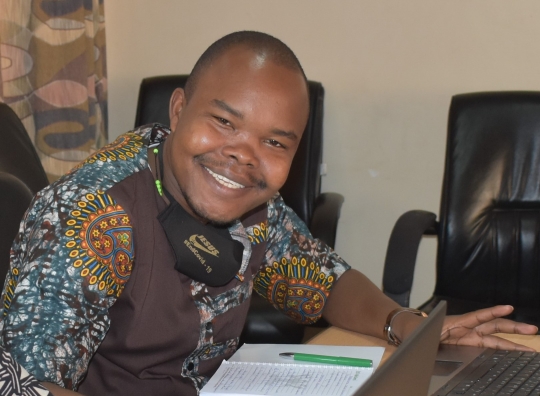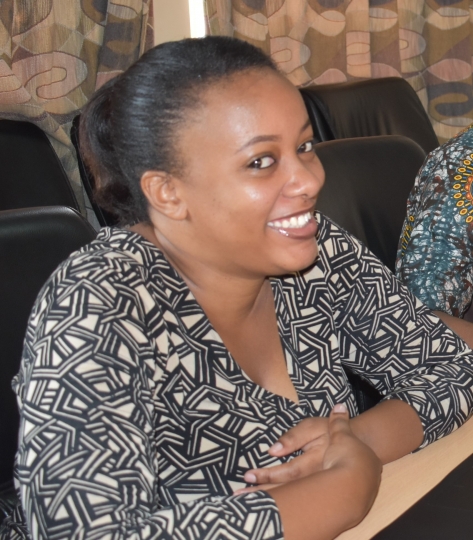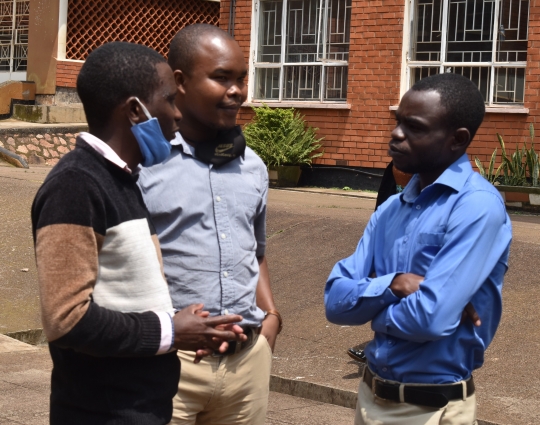About 40 researchers on 30th-31st July 2020 converged at Makerere University for a refresher training to sharpen their skills in Experimental Economics. The training held at the College of Business and Management Sciences (CoBAMS) was organized by Environment for Development Initiative (EfD-Mak Centre).
The two day training was officially opened and closed by the Deputy Principal CoBAMS Prof. Bruno Yawe. Prof. Yawe in a special way thanked the participants for making time and embracing lifelong learning.
He also thanked the Director and the Deputy Director as well as the EfD team for steering the setup of the centre this far.
“ It has been a long journey for those who know where EfD started but also for organizing this training which gets us from our comfort zones of where we are trained to embrace experimental ways of undertaking research.
When pedagogical workshops are organized and people are asked to attend, its rare people go voluntary. Nowadays its by people getting inducted and they undergo that. So in a special way we shall learn until we are lowered at six feet under. So, humbling ourselves to learn new things and ways, is something we have to appreciate,” Prof. Yawe noted..
The Director EfD-Mak Centre Prof Edward Bbaale welcomed participants to Makerere university expressing appreciation for their commitment to coming to all functions of EfD-Mak centre.
“Am very happy that you have time amidst the risk of COVID 19 to be here. It shows the support you have for the centre but also above all the need and commitment to constantly renew you research skills” Prof Bbaale said.
He said, EfD is a global network of fifteen environmental research centres with EfD -Mak Centre in Uganda being one of the newest, following its admission in November 2018 in Vietnam Honai
Prof Bbaale explained that part of the mandate of EfD is to undertake research meant to inform policy in the area of environment and natural resource economics but also training, the reason why EfD is involved in a number of short term but also long term trainings.
“We are here today to have a short training as researchers. Two weeks ago, we had a training for government officials. We are sharpening our research skills. Many of us have specialized in different fields that are very important and that field where you specialized might be unique to you in the environment where you are.
In many of the cases, it is very important that we use our own resources, our own people that have qualified in those respective areas, which we might or some of us might not have and then we sharpen each other and it is for this reason that we are here to have a refresher training in the area of experimental economics.” The Director said
.
Prof. Bbaale explained that the EfD-Mak centre brings another marriage between the College of Agricultural and Environmental Sciences (CAES) and the College of Business and Management Sciences (CoBAMS).
The lead facilitator Dr. John Sseruyange said the training focused on understanding the theoretical underpinnings of experimental economics driving it from experimental practices of research and on the real practice having, for example data doing it, trying to see how the impact is measured in case of impact evaluation.
“We also looked at different designs of experiments and then, we went ahead to look at different types of experiments. The quasi experiment for example we looked at lab and field experiments, with practical trials and designs.
We also looked at impact evaluations, using RCTs. We also looked at process evaluation. For example, under process evaluation we have no baseline information and what you have to do as an investigator is look at the targets against the action. But under impact evaluations, we have a base line or base line information and an end line. In between, we have coordination which could be a program, an activity or an action etc. and with impact evaluation it allows for counter factual analyses -different from process evaluation where you have no base line”, The Don explained.
In all those types of experiments done, Dr Sseruyange said, some practicals that is, having hands on data with simple analyses to show people how experimental research is done were also conducted
Dr. Sseruyange underscored the role of experimental economics saying:
” Experimental research is very important because one, if you organize a very good experiment, you can cater for many econometric problems like endogeneity, because through randomisation, it acts as a natural instrument of its own. And intervention helps us to compare also groups. We can do predictions using experiments and we can inform policy basing on the outcomes of this experiment”.
He commended the participants for the interest shown, the hands on practice and understanding that experimental research can be done.
“The participants enjoyed the training most especially getting the data, writing the different models, we estimated them, and we saw the real impact of that intervention practically. And then, we can still go back not only on regressions but back in descriptive and we see this is the real average outcome you would get even when you do it when you are using descriptive tests.
.
…now they have understood that these things can be done not only in political science, but we can still do them in environmental economics, we can do it in agriculture, for example if you give out technologies in agriculture, for example inputs, how can you assess the impact of your intervention? You are proposing to give out trees by National Forestry Authority, but you don’t take concern of assessing if the tree giving caused an impact of which the tree giving is an intervention.
Dr Sseruyange expressed happiness that the participants learnt that they have been having interventions even in their daily lives, in homes they do have interventions noting that interventions are daily bread but people never knew this.
In his key message to the participants Dr. Sseruyange encouraged them to continue practicing different designs, practicing the analysis with the data given, the models and the results in the articles.
“Meaning, they can get the results from the articles, they can get the data, they can get the commands and try it out themselves. Because I have had some publications in General African Economy, Oxford bulleting in experiments and even others are still coming out. So let them go back and practice. This is practical work, you must be practicing it, just like when you are doing analysis, if you don’t practice you forget the commands. “
Participants speak on the training
Dr. Susan Kavuma, a Lecturer at the School of Economics had this to say:
“We are grateful for this training because it has taught us how we can conduct different types of experiments, what we can call natural experiments and in lab experiments, which are very contemporary issues because time and again researchers have a challenge of accessing data and most of the data is sometimes old and therefore doesn’t speak to contemporary issues.
And so this provides us with an opportunity to get methods which we can use to collect our own data which suit our research topics and problems and design it according to theory and assess the different concepts that we want to assess and it has been interactive. We have been exposed to data.
I think that it was short because we needed practice to conduct our own experiments. For example, if we had more time, we would be able to conduct a lab experiment as participants analyze the data which would have made it more way interesting. So if that was incorporated in the training, it would have added a lot of value for us to have a hands on designing an experiment, right from designing it to collecting the data and analyzing the data. So future programs should put that into consideration that we practically put into practice what we have learnt. Otherwise thank you EfD Makerere centre , we are most grateful for enhancing our capacity in research”.
Brain Ogenwroth, a Masters student of Agricultural and Applied Economics at the College of Agricultural and Environmental sciences attended the training. He said,
“The training on experimental economics has been very impactful in our lives as students. It has trained us on the process of design, randomization and a number of applications on experiments to come up with very meaningful and robust results. So as a student, I take this opportunity to appreciate the different methodologists that we can apply in our research. Not only for academics but to come up with problem solving research and oriented research.
For example, we learnt about impact evaluation which is a very relevant area at the moment. So we really appreciate Environment for Development Initiative, we are proud to be associated and the fact that they think about the big picture, the sustainability of involving students in all different arrangements. Otherwise a normal, it would just call researchers, senior researchers and leave out the students. But we appreciate the entire, coordinating team, the management for EfD, we pledge to be available when called upon.
I really liked the structuring of the course. The previous course we had was all congested in one day and it was hard to exhaust. I like the fact that they responded to the comments we made that day. This one was able to be very practical and spread out to cover two days. We spent more time on application like stata, it was very practical, we appreciate that.
Bwanga Daniel is second year student of Masters of Economics who said:
“I am profoundly happy about this workshop. It has really impacted me to an extent that I have learnt what to do while carrying out my research, how to analyze data and make a model. Actually I have got so much skills about modelling, I am really happy about that and I hope we shall be called back and given more skills so that we can continue in our practice of economics”.
Daisy Kemigisha, is a Masters student of Agriculture and Applied Economics at CAES. She said:
“This training has been very amazing for me because the instructor was very good in his delivery. He talked about relevant things and I got to realize that this experimental designs are actually amazing. They could be used in our research at our faculty of Agriculture.. I learnt a lot, time management was amazing, thank you so much”
Nankimbe Sulaina, is a second year Masters student at the College of Business and Management Sciences who had this to say:
“I have benefitted a lot from this training, especially the experiments because I have studied them before in health economics, the randomized control trials, the quasi experiments, but applying them using stata has been challenging and the training has been useful in that respect.
The content was good, much has been given to us so what I expected I have got. The explanations were very good, it was hands on because everyone was working on their laptop and I was impressed I was getting the results the instructor was talking about”
In his closing remarks the Deputy Principal CoBAMS Prof. Bruno Yawe thanked all participants for keeping time over the two days and making time despite the fact that the second day was a public holiday when Muslims were celebrating Eid but some faithfuls also attended the training.
“This is the beginning of a long journey and please the sky should be the beginning not the limit. You can only know the value of what you don’t know only when you need it. So any opportunity that comes up lets grab it willingly. There is quite a lot of money floating around but you must know the game of conducting experimental studies”, Prof Yawe concluded wishing the trainees the best of journeys back.
